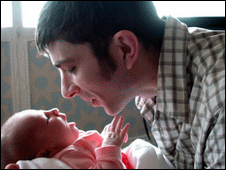
Would it have been better if he wasn't there?
It was once imparted to the father over the phone, yet now it's men themselves who often tell their exhausted partner the sex of the child she has just delivered. But could men be more of a hindrance than a help in the delivery room?
French obstetrician Michel Odent says yes, and even blames fathers for an increasing rate of births by Caesarean section.
At a debate hosted this week by the Royal College of Midwives, Mr Odent will argue against what he dubs "the masculinisation of the birth environment".
The presence of an anxious male partner in the labour room makes the woman tense and slows her production of the hormone oxytocin, which aids the process of labour, so the French doctor contends.
This, he says, makes her much more likely to end up on the operating table having an emergency Caesarean section.
"Having been involved for more than 50 years in childbirths in homes and hospitals in France, England and Africa, the best environment I know for an easy birth is when there is nobody around the woman in labour apart from a silent, low-profile and experienced midwife," he says.